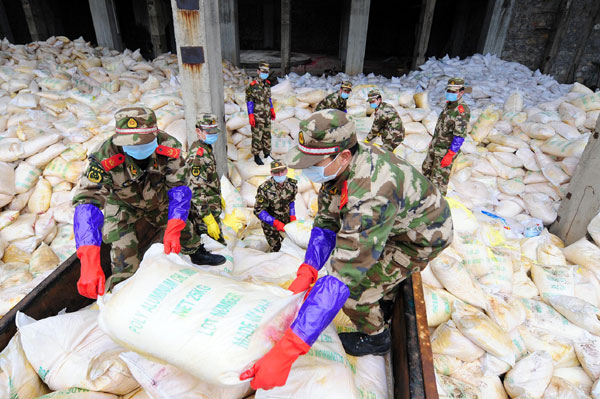Pollutant neutralizer runs low
Updated: 2012-01-31 08:23
By Wang Qian and Huang Feifei (China Daily)
|
||||||||
Drinking water supply steady; seven people put in custody
NANNING/BEIJING - A shortage of aluminum chloride, which neutralizes cadmium, is hampering the fight to clean a pollutant from a South China river.
Reserves of soluble aluminum chloride in Hechi, South China's Guangxi Zhuang autonomous region, will soon run out after more than 3,000 metric tons have been released into the Longjiang River since Jan 20, said Li Wengang, deputy-mayor of Hechi, on Monday.
|
 |
|
Police officers of Liuzhou, in the Guangxi Zhuang autonomous region, move bags of aluminum chloride, which can neutralize heavy metal pollutants, to ensure safe river water. A shortage of aluminum chloride in the city of Hechi could threaten the fight against the water's pollutant. Huang Xiaobang / Xinhua |
Alerted by the discovery of hundreds of dead fish in the Longjiang River, the Hechi environmental protection bureau tested the water on Jan 15 and found cadmium levels higher than the nationally permitted safety level.
As of Sunday, Hechi estimated it still had 256 metric tons of aluminum chloride, and since Jan 20, it had released on average 300 metric tons of the neutralizer a day into the river.
Liang Feng, director of the Hechi information and press office, told China Daily on Monday that because the pollution source is moving downstream, the amount of aluminum chloride needed will gradually decrease.
The shortage of the substance poses a challenge in fighting the cadmium pollution and threatens the water supply in the downstream city of Liuzhou, which has 3.7 million residents, Xinhua News Agency reported.
According to data compiled by an emergency response team, the cadmium level along a 100-kilometer stretch of the Longjiang River was at least five times the permitted level on Monday and water heavily polluted with cadmium flowed by the Luodong Hydropower Station.
Production has been suspended at seven factories involved in heavy metal production or discharging along that section of the river.
Seven people including local plant managers have been put into custody, officials from the regional environmental protection bureau told reporters on Monday afternoon.
Huang Shiyong, Party leader of Hechi, said the city has been taking comprehensive measures to crack down on illegal chemical factories.
Since Jan 24, a team supervising the incident has examined 13 large chemical factories in Hechi as potential sources, and its findings will be released later.
Cadmium is a highly toxic heavy metal used in batteries, electroplating and some industrial paints. Exposure can damage the respiratory tract, liver and kidneys, and can be fatal.
So far no cases of cadmium poisoning were reported in Liuzhou.
Various measures have been taken to lower the river's cadmium level, such as releasing thousands of tons of soluble aluminum chloride and lime to neutralize the contaminants, and increasing the water discharge from dams to dilute the pollution in the upper and lower reaches of the river.
About 500 million cubic meters of water will be released at the Honghua Hydropower Station on the Liujiang River to dilute the pollutants, so the cadmium will remain within the permissible level downstream from the station.
Hechi Mayor He Xinxing said every effort will be made to lower the cadmium level to safeguard the water supply.
According to authorities monitoring the situation, tests showed that the water about 16 km upstream of the Liuxi water plant was just within the safe range at 8 am on Monday.
Amid the tense situation, officials remained optimistic about the water supply in Liuzhou.
"There are about 100,000 metric tons of groundwater available in Liuzhou. We are confident we can guarantee sufficient drinking water for people's daily use," said Zheng Junkang, mayor of Liuzhou.
Huang Yongqiang, deputy manager of the Liuxi water plant in Liuzhou, promised that regardless of the situation, tap water will remain safe.
Xinhua contributed to this story.

 Relief reaches isolated village
Relief reaches isolated village
 Rainfall poses new threats to quake-hit region
Rainfall poses new threats to quake-hit region
 Funerals begin for Boston bombing victims
Funerals begin for Boston bombing victims
 Quake takeaway from China's Air Force
Quake takeaway from China's Air Force
 Obama celebrates young inventors at science fair
Obama celebrates young inventors at science fair
 Earth Day marked around the world
Earth Day marked around the world
 Volunteer team helping students find sense of normalcy
Volunteer team helping students find sense of normalcy
 Ethnic groups quick to join rescue efforts
Ethnic groups quick to join rescue efforts
Most Viewed
Editor's Picks

|

|

|

|

|

|
Today's Top News
Health new priority for quake zone
Xi meets US top military officer
Japan's boats driven out of Diaoyu
China mulls online shopping legislation
Bird flu death toll rises to 22
Putin appoints new ambassador to China
Japanese ships blocked from Diaoyu Islands
Inspired by Guan, more Chinese pick up golf
US Weekly

|

|






